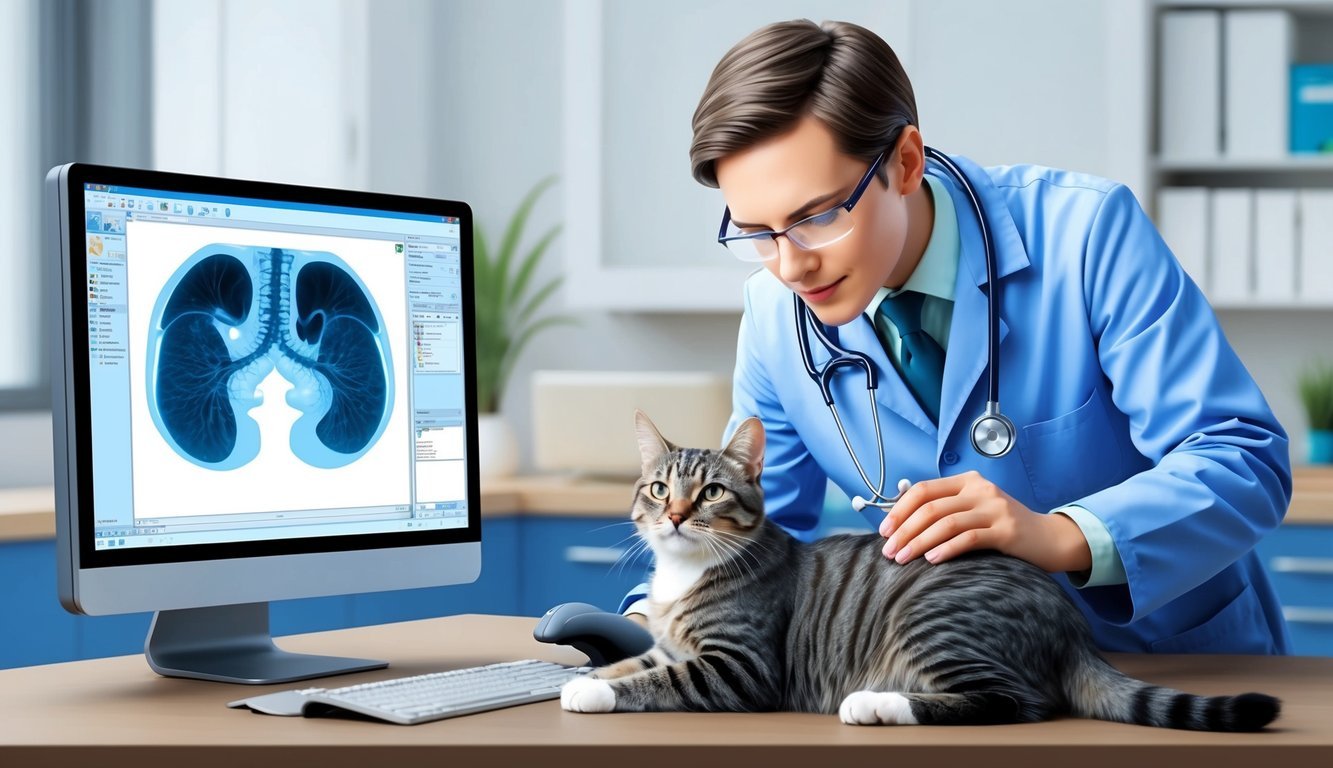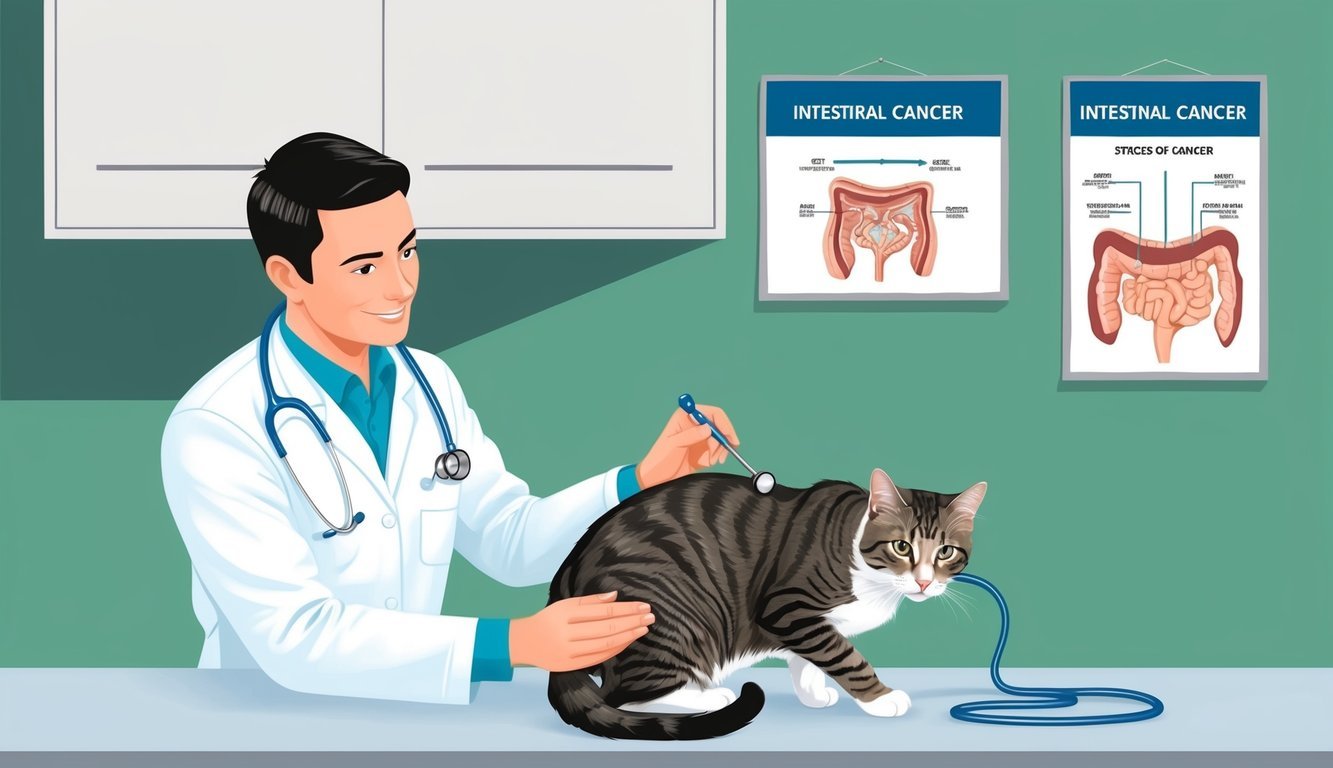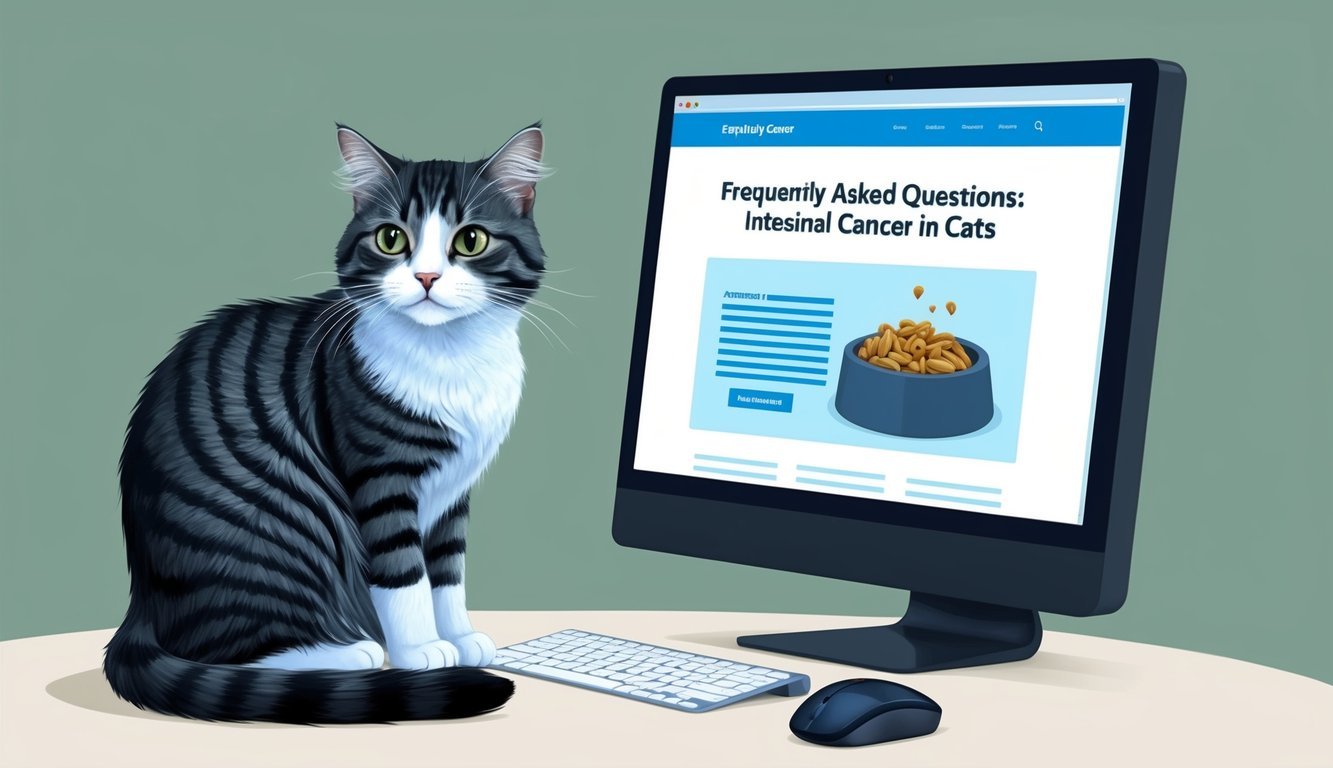Intestinal cancer in cats is a serious concern for pet owners.
It manifests in various ways that can significantly impact your feline’s health. Recognizing the signs early on can be crucial to improve treatment outcomes and enhance your cat’s quality of life.
From changes in appetite to more severe symptoms like vomiting or weight loss, you should be vigilant.
Consult with your veterinarian if you notice anything unusual.
Understanding intestinal cancer involves knowing the types that can occur and the common risk factors associated with them.
While it can be daunting, gaining knowledge about the disease can empower you to take necessary actions for your cat’s health.
Awareness of detection and treatment options can also assist you in making informed decisions should the need arise.
Your experience as a cat owner plays a key role in managing this condition effectively.
Early detection not only helps in choosing appropriate treatment pathways but also in providing comfort and care to your feline companion during a challenging time.
The insights shared here will guide you through essential aspects of intestinal cancer, ensuring you are well-equipped to support your beloved pet.
Key Takeaways
- Recognizing early signs of intestinal cancer can lead to better outcomes.
- Understanding treatment options is essential for managing your cat’s health.
- Regular veterinary check-ups can aid in early detection and prevention.
Understanding Intestinal Cancer in Cats
Intestinal cancer in cats can take several forms, each with distinct characteristics and implications for treatment.
Being aware of these types and the associated risk factors can help you monitor your cat’s health.
Types of Intestinal Cancer
The most common type of intestinal cancer in cats is intestinal lymphoma.
This cancer can arise from the lymphatic tissue in the intestines and is often linked with conditions like Feline Leukemia Virus (FeLV) and Feline Immunodeficiency Virus (FIV).
Another notable type is adenocarcinoma, which originates in the glandular cells of the intestines.
This cancer tends to be more aggressive and may require surgical intervention.
Additionally, there’s leiomyosarcoma, which affects the smooth muscle of the intestines and is less common but still significant.
Lastly, mast cell tumors can also appear in the gastrointestinal area, though they are more typically found in the skin.
Causes and Risk Factors
Multiple factors can increase your cat’s risk for developing intestinal cancer. Genetic factors play a role, with some breeds being more predisposed than others.
Age is another key factor, as intestinal cancers are more frequently diagnosed in older cats.
Other potential contributors include exposure to certain environmental toxins and persistent gastrointestinal infections.
Conditions like chronic inflammation in the gut can also heighten risk.
Additionally, the presence of Feline Leukemia Virus (FeLV) and Feline Immunodeficiency Virus (FIV) can lead to a higher likelihood of developing cancer.
Monitoring your cat for any signs of illness, such as vomiting or changes in appetite, can help in early detection.
Understanding these risks can guide you in maintaining your cat’s health.
Signs and Symptoms
Recognizing the signs and symptoms of intestinal cancer in cats is crucial for early detection and effective treatment.
The symptoms can range from gastrointestinal issues to behavioral changes, both indicating serious health concerns.
Common Symptoms of Intestinal Cancer
You might notice several common symptoms if your cat is suffering from intestinal cancer. Lethargy is often one of the first signs.
Your cat may become less active and may not engage in play as usual.
Weight loss is also a significant indicator, often accompanied by a poor appetite or complete loss of appetite.
You may find your cat reluctant to eat or showing disinterest in food.
In some cases, vomiting and diarrhea occur.
This can manifest as abnormal stool, which may contain blood.
If you observe these symptoms, it’s essential to monitor your cat closely, as they could indicate an urgent need for veterinary attention.
Understanding Behavioral Changes
Behavioral changes can also provide insight into your cat’s health.
You might notice your cat becoming more restless or hiding more frequently.
These changes often stem from underlying discomfort.
Cats can exhibit aggression or irritability when in pain, which can be alarming.
If your cat reacts negatively to touch, particularly on the abdomen, it may be a sign of discomfort.
Weakness and a general decline in energy levels are additional signs to watch for.
If these behavioral changes accompany other symptoms, it’s essential to consult with your veterinarian promptly to address potential intestinal cancer.
Diagnosis and Detection

Identifying intestinal cancer in cats requires a combination of various diagnostic approaches.
Each method plays a crucial role in getting a complete picture of your cat’s health and the extent of the disease.
The Role of Imaging Tests
Imaging tests are essential for visualizing abnormalities within your cat’s gastrointestinal tract.
Common imaging techniques include X-rays and ultrasound.
- X-rays help show any obstructions, masses, or abnormal gas patterns.
- Ultrasound provides detailed images of soft tissues, allowing for examination of the intestines and surrounding organs.
These tests often guide further diagnostics, such as determining the location and size of any tumors.
In some cases, they can also assist in planning surgical approaches if needed.
Laboratory Tests
Laboratory tests provide valuable information about your cat’s overall health.
A biochemistry profile and complete blood count (CBC) can reveal signs of underlying issues.
- Fecal tests are used to check for blood or other abnormalities in the stool.
- Urinalysis offers insight into kidney function and hydration status.
These tests help identify potential complications caused by cancer, such as dehydration or anemia, ensuring a comprehensive assessment of your cat’s condition.
Biopsy and Pathology
Biopsy is the definitive method for diagnosing intestinal cancer.
Various biopsy techniques can be used, including:
- Endoscopy, which involves using an endoscope to collect tissue samples from the intestines.
- Ultrasound-guided biopsy, where imaging helps precisely locate the tumor for sampling.
Pathologists analyze the collected tissue to confirm the presence of cancer cells.
They categorize the type of cancer based on cellular characteristics, which is critical for determining an effective treatment plan.
Biopsy results can take time, but they provide the most accurate diagnosis, integral to your cat’s treatment options.
Treatments for Intestinal Cancer
When confronting intestinal cancer in your cat, it’s crucial to explore various treatment options to enhance their quality of life.
The most common approaches include surgical interventions, chemotherapy, and supportive care, each tailored to your cat’s specific condition.
Surgical Interventions
Surgery often plays a vital role in treating intestinal cancer.
Your veterinarian may recommend surgical removal of the tumor, especially if it’s localized and accessible.
- Benefits: Removing the tumor can alleviate symptoms and potentially extend your cat’s life.
- Considerations: Not all tumors are operable, so your vet will assess factors like tumor type and overall health.
In some cases, additional surgeries might be needed if the cancer recurs or spreads.
Post-operative care will be essential as your cat recovers from surgery.
Chemotherapy and Medication
Chemotherapy is frequently utilized, particularly for conditions like lymphoma, the most common form of intestinal cancer in cats.
- Drug Options: Various medications may be prescribed, including cyclophosphamide, doxorubicin, and prednisone to combat cancer cells.
- Dosage and Schedule: Treatment usually involves multiple cycles to maximize effectiveness while managing side effects.
Your vet might also recommend antibiotics to prevent infections during treatment.
Monitoring your cat closely during chemotherapy is crucial to address any adverse reactions promptly.
Supportive Care and Management
Alongside medical treatments, supportive care ensures your cat remains comfortable.
This can include:
- Nutritional Support: Special diets tailored to meet your cat’s needs can help maintain strength.
- Hydration: Keeping your cat hydrated is essential, especially if they’re experiencing vomiting or reduced appetite.
- Pain Management: Pain relief medications can improve your cat’s comfort levels.
Regular follow-ups with your veterinarian are important to gauge treatment effectiveness and make necessary adjustments.
Each cat’s journey is different, so staying in close contact with your veterinary oncologist will help you navigate this challenging time effectively.
Living with Intestinal Cancer
Managing intestinal cancer in your cat involves careful attention to their dietary needs and overall comfort.
You may face challenges like poor appetite and weight loss, but with the right strategies, you can help maintain their quality of life.
Nutritional Considerations
Nutrition plays a crucial role in supporting your cat’s health during cancer treatment.
Tailoring their diet to their specific needs can help manage symptoms and improve their well-being.
-
High-Quality Protein: Ensure your cat’s diet is rich in easily digestible proteins. Options like chicken or fish can be beneficial.
-
Frequent Small Meals: Try offering smaller, more frequent meals instead of one or two large ones. This can stimulate their appetite and make eating less daunting.
-
Hydration: Keep fresh water available at all times. Hydration is essential, especially if your cat is experiencing vomiting or diarrhea.
-
Consider Allergies: Monitor for any signs of food allergies, which can exacerbate gastrointestinal issues. Speak with your vet about hypoallergenic diets if needed.
-
Supplements: Discuss with your vet the possibility of adding nutritional supplements that might enhance your cat’s appetite or overall health.
Quality of Life and Comfort
Prioritizing your cat’s comfort will significantly impact their quality of life.
Here are some key aspects to consider:
-
Palliative Care: If treatment options are limited, focus on palliative care to manage pain and discomfort. Medications prescribed by your vet can help alleviate symptoms.
-
Comfortable Environment: Create a cozy space for your cat with soft bedding and minimal stressors. A calm environment supports their mental well-being.
-
Monitor Behavior: Pay close attention to any changes in behavior or eating habits. Noticing these early can be crucial for adjustments in care.
-
Social Interaction: Spend time with your cat. Gentle interaction can provide emotional support and reinforce your bond during this challenging time.
-
Regular Vet Visits: Keep up with veterinary appointments to track your cat’s condition and make necessary adjustments to their treatment plan.
By focusing on nutrition and comfort, you can make a significant difference in your cat’s experience with intestinal cancer.
Special Considerations
When dealing with intestinal cancer in cats, it’s vital to consider factors that may influence diagnosis, treatment, and overall health.
Understanding the relationship between different types of cancers in pets and recognizing co-existing health issues can make a significant difference in care and management.
Comparative Oncology in Cats and Dogs
In oncology, the differences between species matter.
Cats and dogs can both develop intestinal tumors, but the types and behaviors of cancers can vary.
For instance, feline lymphoma is more common in cats, often presenting as gastrointestinal cancer.
You may notice that cats with cancer, particularly lymphoma, have a different response to treatment compared to dogs.
Metastasis rates can differ, affecting how the cancer spreads.
While dogs may experience more diverse tumor types, in cats, cancer can often masquerade as inflammatory bowel disease (IBD).
This makes early and accurate diagnosis critical.
Co-existing Conditions
When your cat has intestinal cancer, co-existing conditions can complicate the picture. Feline leukemia virus (FeLV) and feline immunodeficiency virus (FIV) may predispose cats to cancer.
These conditions can weaken their immune system, making it harder to manage cancer effectively.
Take note of any signs that could indicate these co-existing health issues.
Symptoms such as weight loss, lethargy, or abdominal pain might not solely signify cancer but could also be linked to other diseases.
Early detection of these conditions can improve your cat’s overall prognosis.
Always consult with your veterinarian to tailor a care plan that addresses all aspects of your pet’s health.
Prevention and Early Detection

To keep your cat healthy, it’s vital to understand ways to prevent intestinal cancer and how to catch it early.
While you can’t control genetics, being aware of risk factors can help.
Risk Factors:
- Age: Older cats are more likely to develop cancer.
- Breed: Certain breeds may be more predisposed.
- Obesity: Maintaining a healthy weight reduces risks.
Regular health screenings can play a crucial role.
Routine veterinary visits allow for early detection of abnormal signs.
You should pay attention to any changes in behavior, such as:
- Weight loss
- Abdominal swelling
- Lethargy
When you notice anything out of the ordinary, don’t wait.
Schedule a vet appointment to discuss your concerns.
Monitoring your cat’s diet and exercise can also be beneficial.
A balanced diet supports overall health.
Regular playtime and physical activity can help maintain a healthy weight and reduce stress.
Additionally, consider discussing preventive measures with your vet.
They might suggest specific strategies tailored to your cat’s needs based on age, breed, and lifestyle.
By being proactive, you enhance your chances of early detection and better outcomes for your cat’s health.
Frequently Asked Questions

When it comes to intestinal cancer in cats, you likely have several important questions.
Understanding the symptoms, treatment options, and factors influencing this condition can help you make informed decisions for your feline friend.
What are the common symptoms indicating a cat might have intestinal cancer?
Cats with intestinal cancer often show symptoms like vomiting, abnormal stool, weight loss, and lethargy.
You may also notice behavioral changes, such as restlessness or hiding.
If your cat seems uncomfortable when its abdomen is touched, this might be a sign worth discussing with your vet.
What is the typical life expectancy for a cat diagnosed with intestinal cancer?
Life expectancy can vary significantly based on the type of cancer and stage at diagnosis.
Some cats live several months after diagnosis, while others may survive longer with effective treatment.
It’s important to have a discussion with your vet about your cat’s specific situation for a more accurate assessment.
How do vets determine it’s time to consider euthanasia for a cat with intestinal cancer?
Veterinarians typically assess factors such as the cat’s quality of life, level of pain, and overall health before recommending euthanasia.
If your cat is suffering or not responding to treatment, this might lead to difficult discussions about its well-being.
Your vet will guide you through this emotionally challenging decision.
Can you explain the different types of intestinal cancer that can affect cats?
Several types of intestinal cancer can impact cats, including lymphoma and adenocarcinoma.
Each type varies in its behavior and prognosis.
Identifying the specific type usually requires veterinary diagnostic tests, including imaging and biopsies.
What are the available treatment options for a cat diagnosed with intestinal cancer?
Treatment typically involves surgery to remove tumors, chemotherapy, or palliative care to manage symptoms.
The choice of treatment often depends on the cancer type and stage.
Discuss all available options with your vet to determine what might work best for your cat.
What factors contribute to the development of intestinal cancer in felines?
The exact cause of intestinal cancer in cats remains unclear, but several factors may play a role.
Genetics, age, and possibly environmental exposures can influence the likelihood of developing this condition.
Regular veterinary check-ups can help catch any issues early.

